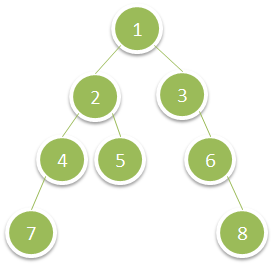Welcome to Subscribe On Youtube
1302. Deepest Leaves Sum
Description
Given the root of a binary tree, return the sum of values of its deepest leaves.
Example 1:

Input: root = [1,2,3,4,5,null,6,7,null,null,null,null,8] Output: 15
Example 2:
Input: root = [6,7,8,2,7,1,3,9,null,1,4,null,null,null,5] Output: 19
Constraints:
- The number of nodes in the tree is in the range
[1, 104]. 1 <= Node.val <= 100
Solutions
DFS or BFS.
-
/** * Definition for a binary tree node. * public class TreeNode { * int val; * TreeNode left; * TreeNode right; * TreeNode() {} * TreeNode(int val) { this.val = val; } * TreeNode(int val, TreeNode left, TreeNode right) { * this.val = val; * this.left = left; * this.right = right; * } * } */ class Solution { public int deepestLeavesSum(TreeNode root) { Deque<TreeNode> q = new ArrayDeque<>(); q.offer(root); int ans = 0; while (!q.isEmpty()) { ans = 0; for (int n = q.size(); n > 0; --n) { root = q.pollFirst(); ans += root.val; if (root.left != null) { q.offer(root.left); } if (root.right != null) { q.offer(root.right); } } } return ans; } } -
/** * Definition for a binary tree node. * struct TreeNode { * int val; * TreeNode *left; * TreeNode *right; * TreeNode() : val(0), left(nullptr), right(nullptr) {} * TreeNode(int x) : val(x), left(nullptr), right(nullptr) {} * TreeNode(int x, TreeNode *left, TreeNode *right) : val(x), left(left), right(right) {} * }; */ class Solution { public: int deepestLeavesSum(TreeNode* root) { int ans = 0; queue<TreeNode*> q{ {root} }; while (!q.empty()) { ans = 0; for (int n = q.size(); n; --n) { root = q.front(); q.pop(); ans += root->val; if (root->left) q.push(root->left); if (root->right) q.push(root->right); } } return ans; } }; -
# Definition for a binary tree node. # class TreeNode: # def __init__(self, val=0, left=None, right=None): # self.val = val # self.left = left # self.right = right class Solution: def deepestLeavesSum(self, root: Optional[TreeNode]) -> int: q = deque([root]) while q: ans = 0 for _ in range(len(q)): root = q.popleft() ans += root.val if root.left: q.append(root.left) if root.right: q.append(root.right) return ans -
/** * Definition for a binary tree node. * type TreeNode struct { * Val int * Left *TreeNode * Right *TreeNode * } */ func deepestLeavesSum(root *TreeNode) int { q := []*TreeNode{root} ans := 0 for len(q) > 0 { ans = 0 for n := len(q); n > 0; n-- { root = q[0] q = q[1:] ans += root.Val if root.Left != nil { q = append(q, root.Left) } if root.Right != nil { q = append(q, root.Right) } } } return ans } -
/** * Definition for a binary tree node. * class TreeNode { * val: number * left: TreeNode | null * right: TreeNode | null * constructor(val?: number, left?: TreeNode | null, right?: TreeNode | null) { * this.val = (val===undefined ? 0 : val) * this.left = (left===undefined ? null : left) * this.right = (right===undefined ? null : right) * } * } */ function deepestLeavesSum(root: TreeNode | null): number { const queue = [root]; let res = 0; while (queue.length !== 0) { const n = queue.length; let sum = 0; for (let i = 0; i < n; i++) { const { val, left, right } = queue.shift(); sum += val; left && queue.push(left); right && queue.push(right); } res = sum; } return res; } -
// Definition for a binary tree node. // #[derive(Debug, PartialEq, Eq)] // pub struct TreeNode { // pub val: i32, // pub left: Option<Rc<RefCell<TreeNode>>>, // pub right: Option<Rc<RefCell<TreeNode>>>, // } // // impl TreeNode { // #[inline] // pub fn new(val: i32) -> Self { // TreeNode { // val, // left: None, // right: None // } // } // } use std::rc::Rc; use std::cell::RefCell; impl Solution { fn dfs(root: &Option<Rc<RefCell<TreeNode>>>, depth: i32, max_depth: &mut i32, res: &mut i32) { if let Some(node) = root { let node = node.borrow(); if node.left.is_none() && node.right.is_none() { if depth == *max_depth { *res += node.val; } else if depth > *max_depth { *max_depth = depth; *res = node.val; } return; } Self::dfs(&node.left, depth + 1, max_depth, res); Self::dfs(&node.right, depth + 1, max_depth, res); } } pub fn deepest_leaves_sum(root: Option<Rc<RefCell<TreeNode>>>) -> i32 { let mut res = 0; let mut max_depth = 0; Self::dfs(&root, 0, &mut max_depth, &mut res); res } }